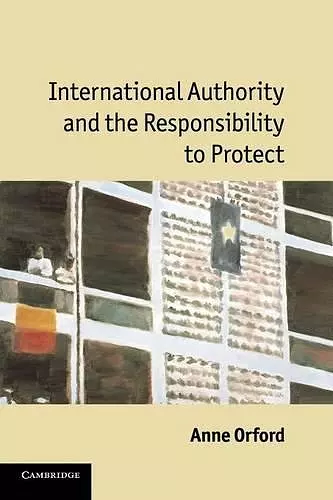International Authority and the Responsibility to Protect
Format:Paperback
Publisher:Cambridge University Press
Published:20th Jan '11
Currently unavailable, and unfortunately no date known when it will be back
This paperback is available in another edition too:
- Hardback£100.00(9780521199995)

A study, from Hobbes to the UN, of attempts to ground authority on the capacity to guarantee protection.
The idea that states and the international community have a responsibility to protect populations has shaped debates about conflict prevention, humanitarian action, peacekeeping and territorial administration since 2001. This book offers a history, from Hobbes to the UN, of attempts to ground authority on the capacity to guarantee protection.The idea that states and the international community have a responsibility to protect populations at risk has framed internationalist debates about conflict prevention, humanitarian aid, peacekeeping and territorial administration since 2001. This book situates the responsibility to protect concept in a broad historical and jurisprudential context, demonstrating that the appeal to protection as the basis for de facto authority has emerged at times of civil war or revolution - the Protestant revolutions of early modern Europe, the bourgeois and communist revolutions of the following centuries and the revolution that is decolonisation. This analysis, from Hobbes to the UN, of the resulting attempts to ground authority on the capacity to guarantee security and protection is essential reading for all those seeking to understand, engage with, limit or critique the expansive practices of international executive action authorised by the responsibility to protect concept.
'The turn to the language of 'protection' reveals an authoritarian undercurrent in present debates about international intervention. Drawing on doctrines of international executive power (Hammarskjöld) and the history of Western political theory (Hobbes), Anne Orford is able to throw a sharp light on the ideological significance of the debates on international administration and the responsibility to protect. Inspired by humanitarian and legalistic purposes, she argues, the exercise of international executive rule tends to impose demands of unconditional obedience over distant populations. The result is a welcome corrective to the view that international administration is above all a 'technical' problem. Never have the political implications of the theory and practice of international governance been explored with more sophistication than here. Written with elegance and verve, this is the most powerful analysis of the dilemmas of the management of globalization by international institutions in the twenty-first century that I have read.' Martti Koskenniemi, Professor of International Law, University of Helsinki
'During the past decades, the responsibility to protect has become, under the auspices of the United Nations, the undisputed creed of the international community, including agencies, governments, and non-governmental organizations. In her insightful historical and juridical study, Anne Orford examines the genealogy and discusses the implications of this new principle, which entails a profound rupture of the previous consensus regarding state sovereignties and justifies the increasing military as well as humanitarian interventionism. Articulating innovative theoretical reflection and well-documented case studies, the book offers a remarkable critical inquiry into the contemporary international order.' Didier Fassin, James D. Wolfensohn Professor of Social Science, Institute for Advanced Study, Princeton
'This book stands out amongst a growing field of commentaries on R2P for its hard-hitting and valuable insights into the importance of R2P as a framework for rationalising and legitimising external intervention in the post-colonial world. As Orford astutely argues the importance of R2P revolves around the claims of capacity (of interveners) and assertions of a lack of capacity (of those subject to intervention) to construct discourses of authority and hierarchy which bypass the traditional framings of international law, sovereignty and rights. This book will shape the future discussion of R2P and will be required reading for those working in this area.' David Chandler, Professor of International Relations, University of Westminster
'Over the years, Anne Orford has established herself as one of the most acute and insightful scholars of international law. In this superb, elegantly written book, she presents a genealogy of the relationship between 'protection' and 'sovereignty' that is clearly crucial to an understanding of contemporary debates about the Responsibility to Protect (R2P). Drawing not only upon international law, but history, philosophy and political theory, she here provides us with a work that is not only the most far reaching analysis we have of the concept of the R2P (and it is bound to startle many of those engaged in these debates) but one that poses fundamental questions about sovereignty, international institutions, and the contemporary international system.' Antony Anghie, Samuel D. Thurman Professor of Law, University of Utah
'… Anne Orford, a professor at Melbourne Law School in Australia, approaches the question of intervention from a distinct and original angle.' Mahnoush H. Arsanjani, American Journal of International Law
'Orford's thesis is challenging, but she is more than up to the challenge … This is an elegantly written and convincingly argued book in its central thesis. Orford thinks clearly and writes well with an admirable economy of words … makes a major and important contribution to this rapidly growing literature on R2P.' Ramesh Thakur, European Journal of International Law
'Anne Orford's well-written book offers a significant contribution to the existing literature in this area in that it not only addresses some of the concerns as to the relevance and effectiveness of the emerging norm in resolving the dilemma between sovereignty and intervention, but it also examines both the debate and the practice of protection from the perspective of the jurisdictional basis and lawful authority for intervention … provides well-informed and timely insights on this emerging concept and demonstrates well its normative value … a well-researched analysis of both the theory and practice of intervention for humanitarian purposes that will be valuable reading for practitioners and scholars alike …' Tom Kabau, Journal of Conflict and Security Law
'… the book offers a valuable and compelling assertion of both the power of the responsibility to protect concept and the potential dangers of its unfettered application.' Barbara Miltner, British Yearbook of International Law
ISBN: 9780521186384
Dimensions: 229mm x 152mm x 13mm
Weight: 340g
246 pages